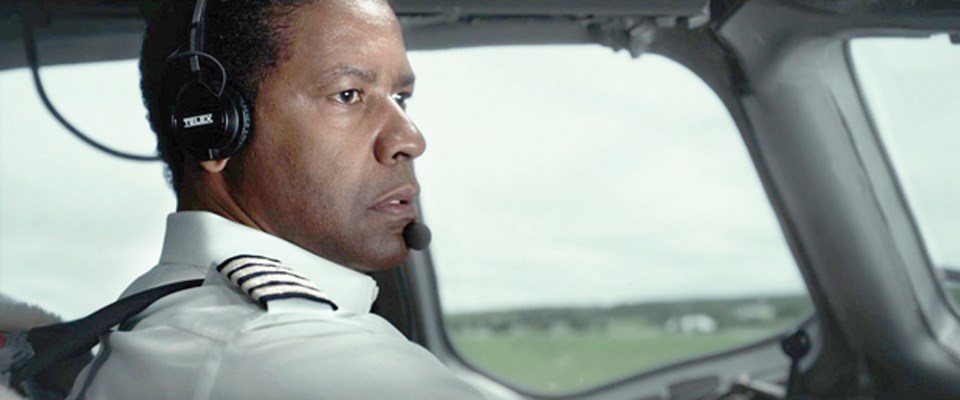Flight. Directed by Robert Zemekis. Starring Denzel Washington. Rating: 8 (out of 10)
I know what you're thinking: this time around it's a plane; last year it was a train, and wasn't it a subway car the year before that? What is it with Denzel Washington and transportation as co-stars?
But take heart: what begins as a big-budget disaster beast reveals the heart of an indie character study, with Washington delivering a career best.
The film begins like any other day: Whip Whitaker (Washington) wakes up drunk, with a cute companion in his bed. A little weed, a little coke, and it's all good.
But Whip's not any other man: in the next scene we see him in his pilot's uniform, preparing to fly an Atlanta-bound plane with 102 souls on board.
That jarring juxtaposition prepares us for what comes next: the plane's malfunction, terrifying dive, and intense crash. Director Robert Zemekis, back with live-action after a decade of pioneering stop-motion films (The Polar Express, Beowulf, A Christmas Carol) employs in-your-face filmmaking from the very start, so that whether it's a shot of the anxious co-pilot (Brian Geraghty), or up-close gauge readings, we feel as though we're right there in the cockpit.
It's one of the best airline-disaster sequences in recent memory, but Zemekis infuses the chaos with a poignant moment, when Whip coolly tells the lead flight attendant (Tamara Tunie) to leave a message for her son for when they eventually find the black box recordings.
Whip is hailed as a hero for saving most of the passengers but dread sets in as soon as the pilot wakes up and sees his old Navy buddy (Vancouver's Bruce Greenwood) at the foot of the bed. "It's a bit of a show," warns Charlie, as reps from the pilots' union, the NTSB and the media all line up for Whip's side of the story. And if Whip's toxicology report gets out, they'll be shouting for blood.
He fares no better when he meets his lawyer, Hugh Lang (Don Cheadle) whose first words to Whip are "death demands responsibility." We're trying to get it designated an Act of God, says Hugh. "Whose God would do this?" asks Whip.
At first glance Whip has nothing in common with rock-bottom addict Nicole (Kelly Reilly, fantastic) but a primer on the extent of Whip's alcoholism proves they couldn't be more similar. A tenuous relationship develops, ever tested by Whip's refusal to get treatment - or even to get sober long enough for legal proceedings - and Nicole's terror that Whip will bring her back into her dark addiction.
The success of the film hinges on its ability to segue from a disaster movie into a compelling legal and human drama without losing any of its intensity, and Zemekis pulls it off seamlessly. New suspense threads are introduced via when and how Whip will implode, and the depths that "the suits" will sink to in order to save the airline. John Goodman enters at key moments to advance this storyline - as Whip's dealer and only friend - but those in the audience who think that his character is strictly for laughs fail to see the pathos of the situation.
A few sequences are eked out for too long (the wise and wise-cracking cancer patient, for example) and become preachy towards film's end, but they do not detract from Washington's virtuoso performance as a man clinging to his own lies, whatever the cost.



